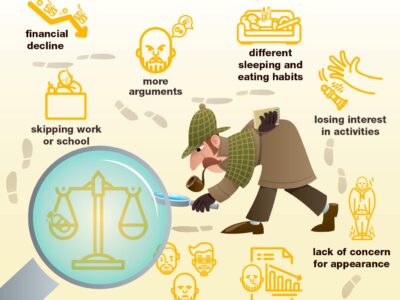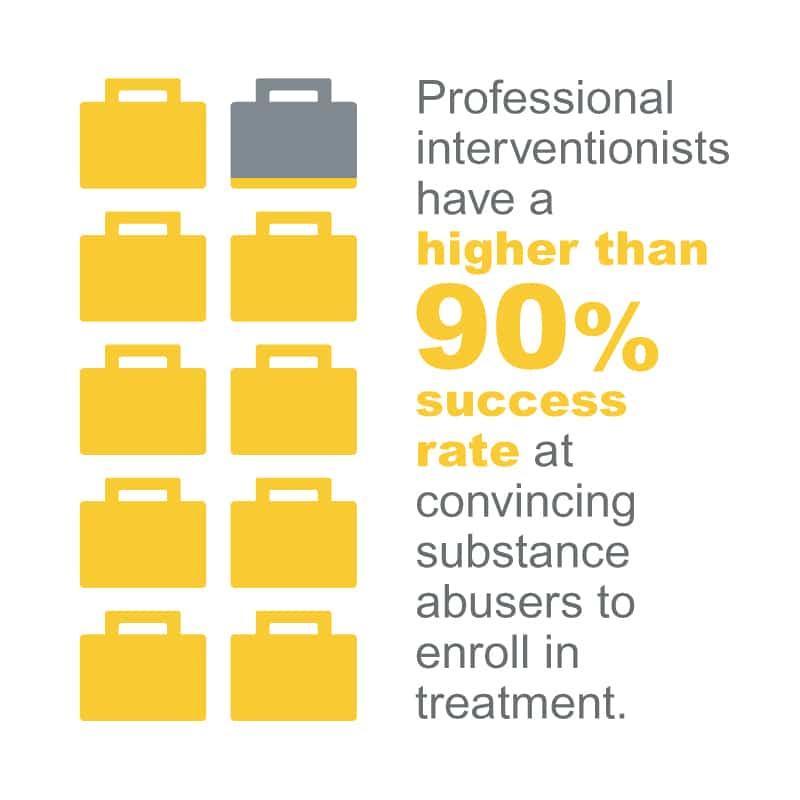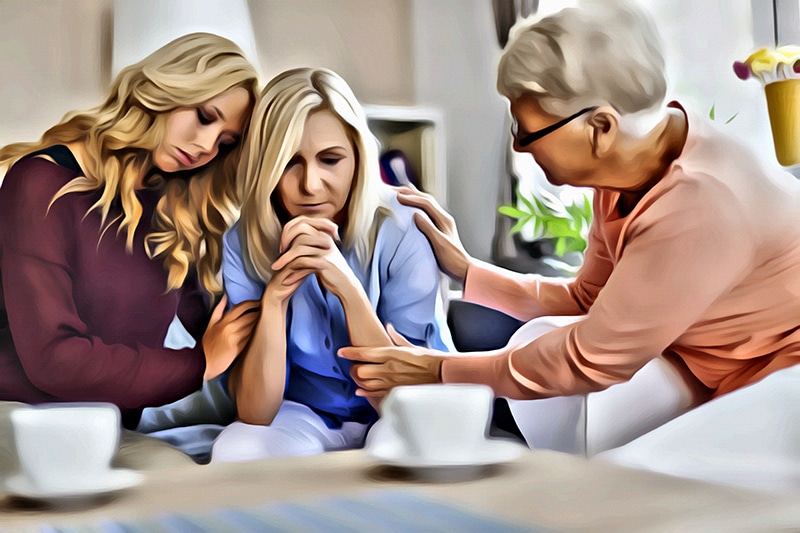With over 20 million people in the U.S. struggling with substance use disorders, it’s highly likely that someone close to you has already or will encounter difficulties with alcohol, illicit drugs or prescription pills. Knowing what to look for, how to react and what steps to take to help your close friend or family member for the long-term will put you in a position to potentially save a life. Watching someone you care for ruin his or her life through substance abuse is disappointing and frustrating. One common strategy is to let people with addictions hit rock-bottom, but this is an egregious error. Addiction is a progressive and chronic brain disease that only worsens over time. If someone in your life is suffering from addiction, the time to step in is now. While this may not be an easy task, there are ways to make the process less confrontational and more productive.
If you or a loved one are struggling with addiction, please call 772-774-3872.
How to Detect a Substance Abuse Problem?
It can be extremely difficult to recognize the signs of an alcohol or drug problem in a close friend or someone in your immediate family. For one, people are often very secretive about their substance abuse habits; secondly, alcohol and prescription pills (which account for a large percentage of all addictive disorders)[1] are perfectly legal. Unless you’re around your loved one 24/7/365, it would be nearly impossible to know how much and how often he or she drinks or if prescription drugs are being abused.

Once you suspect an addiction or substance abuse problem, your next step should be to learn everything you can about addiction. While you can’t watch every move that your child, parent or spouse makes, you can be aware of subtle signs that could clue you in about any problematic substance abuse [2]:
Noticing any of the aforementioned signs may indicate that your loved one has some sort of substance abuse problem that warrants further investigation. Once you can determine whether or not your close friend or relative is using/abusing drugs or alcohol, you can begin to ascertain whether the problem has developed into a substance use disorder (SUD). The Diagnostic and Statistical Manual of Mental Disorders, Fifth Edition (DSM-5) sets forth the following criteria [3]:
- – Taking the substance in larger amounts or for longer than the you meant to
- – Wanting to cut down or stop using the substance but not being able to
- – Spending a lot of time getting, using or recovering from use of the substance
- – Cravings to use the substance
- – Not managing to do what you should at work, home or school because of substance use
- – Continuing to use, even when it causes problems in relationships
- – Giving up important social, occupational or recreational activities because of substance use
- – Using substances again and again, even when it puts the you in danger
- – Continuing to use, even when you know you have a physical or psychological problem that could have been caused or made worse by the substance
- – Needing more of the substance to get the desired effects
- – Development of withdrawal symptoms, which can be relieved by taking more of the substance.
What to Do if You Suspect an Addiction Problem

So you’ve done your research and have concluded that your loved one is likely struggling with an addiction to drugs or alcohol. What now? As you probably can imagine, this is not the easiest conversation to have with someone you care for. Still, this is not a conversation you can afford to shy away from either. There’s a good chance that your friend or family member has no idea that his substance abuse has gotten out of control. Also, addiction is not a problem that most people can fix without some help.
While you and others might be hoping that your loved one suddenly realizes the damage that substance abuse is causing and decides to stop using, individuals suffering with substance use disorders rarely take this route. This is because repeated abuse of drugs or alcohol creates changes in the brain related to judgment, decision making and self-control.[4] Expecting a person with an addiction to make the decision on his or her own to cease substance abuse is foolish. Almost everyone with an addiction needs some sort of impetus to make the decision to change.
Starting a conversation with someone close to you about his or her destructive substance abuse is difficult. Before beginning that discussion, some of the frequently asked questions are:
Q: How do I know if I’m overreacting?
A: There is no acceptable amount of illicit drug use, so if you notice your loved one using drugs, you are not overreacting. When it comes to alcohol abuse, if your loved one is experiencing obvious negative life consequences as a result of drinking, then you are not being overdramatic, you care.
Q: How do I bring up substance abuse without causing an argument?
A: It’s impossible to know how anyone will react when approached about their substance abuse. The best thing you can do is be honest, nonjudgmental and non-confrontational. The purpose of talking to your friend or family member is not to make him feel bad about substance abuse, but to motivate him to change his behavior. Even if the conversation does devolve into an argument, which is a distinct possibility, saying something is better than not saying anything.
Q: How can I convince someone to get treatment?
A: The initial reaction from your loved one will almost certainly be one of denial. After you and others have spoken several times to your friend or family member about the damage substance abuse is causing, it might begin to feel futile. The important thing here is to remain consistent and positive in your message. Saying things like “We care about your health and want you to get help,” or “You’re important to us, and we don’t want alcohol to ruin your life” will keep the message positive, while focusing on your concern. Remember, this is not a time for blaming or personal attacks.
Q: What if substance abuse has not led to serious life consequences, but I still feel it’s a problem?
A: One of the more commonly held myths about drug and alcohol abuse is that people with these addictions are unable to function properly. A large portion of people with substance use disorders are high-functioning and have jobs, money, education and appear to most of the world to be regular people without addictions. Don’t be fooled, as many high-functioning individuals with a substance use disorder will inevitably become low-functioning. While you can probably expect even greater denial because of the lack of negative life consequences, it’s still very important to say something in these situations. Early detection can make it so a small problem doesn’t become a disaster.
When Is It Time for an Intervention?
More often than not, the last person to know that he or she has a substance abuse problem is the substance abuser.[5] Friends, family members and coworkers are generally well aware of the problem long before the person with the addiction. Ideally, an intervention serves as the catalyst to get a person to understand that he or she has an addiction problem and that it’s time to seek help.
When your loved one’s substance abuse has gone too far and individual pleadings from friends and family members aren’t working, it may be time for an intervention. In many cases, interventions are set up following some sort of catastrophic event brought on by substance abuse. These can include:
- Job loss
- Bankruptcy
- Injury
- Overdose resulting in hospitalization
- Legal problems
- Divorce or separation
Working with a professional interventionist

While most interventions start off with good intentions, many deteriorate into combative shouting matches. This is the most common depiction of drug and alcohol interventions from Hollywood production studios, but this does not have to be the reality. Working with a professional interventionist makes the entire process smoother and more likely to be effective.
How A Professional Interventionist Improves Your Chances for Success
Interventions are periods of high emotional volatility. On one hand, friends and family members are frustrated that the addiction has gotten so far out of control. On the other hand, the person with the addiction has likely created an intricate system of denial, making it difficult for him or her to clearly see the situation. The result is resentment on both sides, which frequently manifests itself in shouting matches, name calling and finger pointing.
A professional will ensure that your intervention remains on track and on task. Studies show that using a professional interventionist leads to a higher than 90 percent success rate in getting a person with an addiction to accept treatment.[6] This is because the interventionist is a neutral party who has no personal connection to the addicted individual or to the people running the intervention. An interventionist has also worked with dozens of other families in the past and understands what works and what doesn’t. He or she can advise you on who should be present, what to say, what not to say, how to prepare and what to do if the addicted person accepts or declines treatment.
Here are some things to keep in mind if you’re considering an addiction intervention:
Selecting the Right Addiction Recovery Facility
Every substance abuse patient is different, as is every addiction. The proper treatment should vary depending on what substance the patient has been abusing, how long the patient has been abusing it and any pre-existing conditions the patient might have.
Just as not every treatment is right for every patient that abuses the same substance, not every rehab center is right for everyone. However, finding the best treatment can be as easy as finding the right rehab center. Certain recovery centers specialize in certain types of treatments or are known to handle specific types of addiction.
One of the first things you should look for in a treatment facility is whether or not it is accredited. Accreditation refers to approval by the regulatory body that oversees the operation of drug rehabilitation centers. Facilities become accredited by employing the highest-industry standards and using evidence-based practices.
Several others factors to consider when choosing the best treatment center for you or your loved one are:
Understanding What You Can and Can’t Control
Coming to terms with a friend or family member’s substance abuse habit is a hard pill to swallow. But now that it’s out in the open, you and those close to you can begin to address the problems that led your friend or loved one to substance abuse in the first place. It’s important to state early on that you are willing to help in any way that you are able to and is healthy. However, most of the work lies with the substance abusing individual as it would either be inappropriate and impossible for anyone else to do the necessary hard work for them.

The person in need of treatment must:
- Acknowledge that they have a drug or alcohol problem that it is causing them great physical and psychological damage
- Make the decision to stop using the given substance forever for themselves and then act accordingly
- Accept that they cannot fix the drug or alcohol addiction on their own and they must seek outside help in order to overcome it
- Sever ties with any friends or acquaintances formerly associated with drug-related activities and stop visiting former places of substance abuse as well
What you can do as a friend or family member
That being said, there is a great deal that you can do as a friend or family member that can go a long way, particularly if they’ve specifically come to you for help. However, it’s important to set boundaries at the beginning so the person who the intervention is being held for doesn’t become dependent on you for guidance and unable to deal with any of his problems without you. As long as it does not impair the ability of your loved one to make their own life changes in order to fully recover, feel free to offer support in the following ways:
- Assure them that you know that what he is doing is very difficult and that it’s also the right thing to do
- Convince them to see a doctor, which at the very least will give him an outside, professional opinion on his condition from someone with whom he does not have a personal connection with
- Encourage them to seek medical help, as the problem has gotten bigger than the two of you
- Listen to their struggles and successes throughout recovery and encourage them to persist when times are tough
For many, relapsing is a normal part of recovery and is far from a death sentence
Remember to support your loved one in the period following rehabilitation as well. Being released from treatment doesn’t mean being cured. Addiction is for life; it’s only substance abuse and professional treatment that ends.
Always remember that you can’t make your addicted loved one quit and you can’t do his work in recovery for him. Don’t be discouraged by a relapse, it isn’t your fault. For many, relapsing is a normal part of recovery and is far from a death sentence. For the most part, your loved one’s progress is in the hands of professionals so remember not to take things personally when treatment isn’t going well. When they finally get out of rehab, check up on them regularly but do so in a way that doesn’t undermine their autonomy or recovery.
Behavioral Health Centers is Here to Help
The trusted professionals at Behavioral Health Centers are proud to guide you in helping your loved one get the treatment he or she needs. We will assist you with every step of the journey from addiction through recovery. Just as recovering from an addiction is nearly impossible to do alone, convincing a loved one on your own to check into rehab is equally difficult. Let Behavioral Health Centers give you the best chance for success.
Your loved one may not be ready to make the potentially life-saving call to Behavioral Health Centers to receive addiction treatment – but that doesn’t mean you can’t call. We have addiction care experts standing by ready to advise you on what to do to get your spouse, relative, friend or coworker into addiction treatment as soon as possible. Please give us a call at 772-774-3872 today for addiction intervention help.
References:
- https://www.samhsa.gov/disorders/substance-use
- https://www.drugabuse.gov/related-topics/treatment/what-to-do-if-you-have-problem-drugs-teens-young-adults
- https://www.dsm5.org/psychiatrists/practice/dsm
- https://www.drugabuse.gov/publications/drugs-brains-behavior-science-addiction/drugs-brain
- https://www.healthypeople.gov/2020/topics-objectives/topic/substance-abuse
- https://www.ncadd.org/family-friends/there-is-help/intervention-tips-and-guidelines






